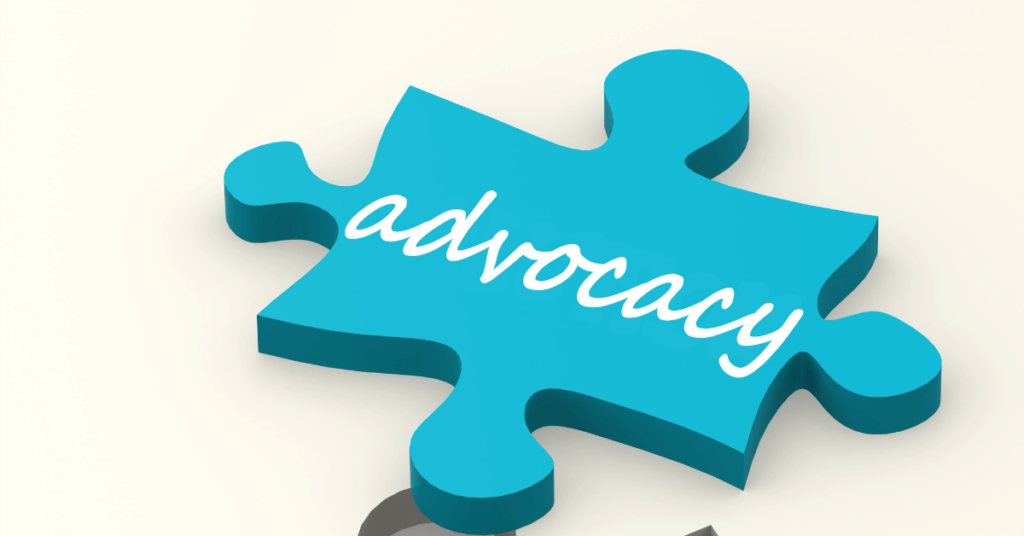As a parent or caregiver, one of the greatest gifts we can give our children is to teach them to be a self-advocate. That is especially important for our children with autism and ADHD. They have a special set of needs and preferences, and they need to be able to speak up for themselves. So how can you encourage self-advocacy in your child with autism and ADHD?
Our son J has come a long way in self advocating over the years. One good example is his peanut allergy. When he was in preschool, he ate a cookie that must have had trace peanuts in it. We had to go through the whole process of giving him an Epi-Pen and then taking him to the emergency room at the hospital. That experience really had an impact on him. He is incredibly careful with food, especially when he is at a friend’s house or school, and I am not with him. J always asks to either see the label to look at himself to check to see if there are any peanut warnings or asks the adult to review it. If he is not sure whether it has peanuts or not, he will not eat it.

What is self-advocacy for those with autism?
According to Dictionary.com, self-advocacy is defined as “the act or condition of representing oneself, either generally in society or in formal proceedings, such as a court.” In other words, a person can speak for themselves and handle their affairs instead of having someone else do it for them.
As our children grow into teenagers and then into young adults, being able to self-advocate is so important. Yet, it doesn’t happen overnight. As parents and caregivers, it is important that we encourage self-advocacy in our children with autism and teach them the skills they need. Part of it is developing independence overall, but another part is learning specific skills needed for advocating for themselves. Those skills include speaking up, knowing their rights, negotiating and problem solving.
What about disclosure of autism?
Disclosure is a tricky thing, especially as the person with autism ages and seeks jobs – whether it is a part-time job as a teenager or full-time employment as an adult. Autism is an “invisible” condition, which means in most cases you cannot look at someone and know whether they are autistic. Because autism is a spectrum, each person presents differently to others. For some, you would not really know they are autistic unless they disclose it to you. For others, it is more apparent.
Disclosure and self-advocacy are related in many cases. To be able to ask for accommodations in a workplace, the person has to disclose a certain amount of information. For example, if lighting in the person’s work area is very bothersome, the person with autism may need to ask their employer for adjustments. So, do they disclose they have autism? Maybe or maybe not. At minimum, they need to disclose they have sensitivity to lights. That may be all that is necessary.
Another example is a college student who will need to work with the university’s disability office to apply and obtain accommodations for college classes. The student will need these skills to be able to effectively work with the office and instructors to obtain the accommodations needed to be successful in obtaining their degree.
Even with the American Disabilities Act (ADA) in the United States, disclosure is complex because it could impact the person’s career. While more companies are talking about diversity and inclusion, the reality is still too many may limit how they promote and compensate individuals with autism and other intellectual disabilities.
Obtaining an employment or life coach who specializes in helping your teenager prepare for employment and secondary education may be a good step to help your teen understand how to self-advocate and when to self disclose. That is a step we are taking now with our son J, so that he can obtain the help he needs to be ready for working a part-time job while he is still in high school and preparing for college and full-time employment in the future. One place to start is with your state’s Vocational Rehabilitation agency. You may also have other organizations locally that work with Vocational Rehabilitation or offer employment/life coaching to those with autism.

Why is self-advocacy so important?
Being able to speak up for yourself, negotiate and manage your own affairs is an important part of independent living as an adult. For many on the autism spectrum, they will be able to do this as an adult. For some, they will need more help from others. Either way, it’s important that people have a say in their own lives. It is essential that children, teens and adults with autism and ADHD communicate effectively what they need and want.
Ways to teach self-advocacy to children with autism and ADHD
Schools should support our children with autism/ADHD to learn self-advocacy skills through the Individuals with Disabilities Education Act (IDEA). However, we still need to take ownership to teach our kids these necessary skills. But how do you teach self-advocacy to children with autism and ADHD? Here are six ways.
1. Teach communications skills
Good communications skills are at the heart of self-advocacy. Encourage your child to speak up for what they need and want. If your child has difficulty communicating, enlist the help of a speech or behavior therapist. It is one of the best investments you can make in your child.
2. Help your child be comfortable making decisions
Offering choices and letting your child choose one is a great way to help them get comfortable making decisions. When our children are young, they can be easy like offering two choices for lunch. Or letting them choose which clothes they will wear to school the next day. As they get older, their choices become more complex. Helping them learn how to make decisions about easier things when they are young will give them confidence to make decisions when they are older.
My dad used to tell me that as adults our decisions and our actions will be our own. We will reap rewards for good choices and pay the consequences of bad ones. It’s important to teach our kids about decision making. We need to help them understand there are rewards and consequences as a result of our decisions. This is certainly a life lesson that will serve them well into adulthood.

3. Encourage them to speak up about their needs and preferences
A big part of self-advocacy is to encourage your child with autism and ADHD to speak up about their needs and preferences. They need to represent those on their own and learn how to ask for what they need. They also have to get comfortable asking for them in different settings with other authority figures.
What are some ways you can encourage this? First, tell them to let you know as the parent and caregiver of what they need or want. Second, let them know they should speak up at school to their teacher(s) and/or speech therapist for help. Third, while you are out and about, have your child ask questions if you need help finding something. For instance, if you are looking for a certain type of food that you cannot find at the grocery store, have your child ask the store employee for help. Another example would be to have your child ask their doctor questions at the next appointment. Encouraging them to practice while you are there will give them confidence and motivation to speak up when you are not there.
4. Let your child struggle to solve the problem
I’ll admit that this is a hard one for me. I’m a problem solver, and it’s challenging for me not to jump in and help find a solution when someone discusses a difficulty they are having. Yet, I am getting better at staying back and letting my kids work out problems for themselves. I’m always there to provide some coaching or help them if it’s a really difficult problem, but I am trying more to let them struggle and work it out on their own. I know it’s an important skill for them to learn.
5. Teach them to negotiate
Let’s face it – most days we find ourselves negotiating for what we need or want in some way. It may be as simple as what time we will eat dinner as a family to suit everyone’s needs. More difficult negotiations may be a big purchase like a car. Teenagers get to be particularly good at negotiating – for additional video game time, bedtime exceptions, the purchase of a new gadget or another item, or a host of other things. While we sometimes may not like the process of negotiating with our teenagers, remember that they are learning a valuable skill 😊
6. Help your child better understand others’ perspectives
While teaching your child to speak up for themselves is good, it is also necessary to help them understand that other people may have a different perspective or opinion about the topic or request. Helping your child learn to evaluate those perspectives and to take them into consideration of the situation is definitely a life skill they need. Want to learn how to teach perspective-talking? Check out this article.
How have you taught your child with autism and ADHD self-advocacy? What has worked for your child? Leave a comment to share and encourage other parents and caregivers as we move forward in our journey!







